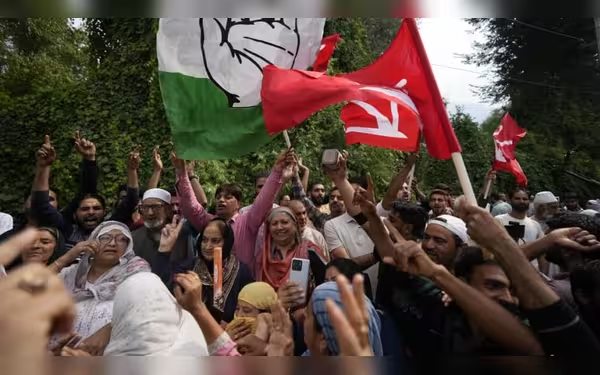Saturday, November 16, 2024 05:51 PM
Kashmir Elections Spark Hope Amid Modi's Central Control
- Elections signal hope for autonomy in Kashmir.
- Opposition parties gain ground in recent elections.
- Modi's government retains ultimate authority over Kashmir.
 Image Credits: channelnewsasia
Image Credits: channelnewsasiaKashmir elections bring hope for autonomy, yet Modi's government maintains ultimate control over the region.
The recent elections in Kashmir have sparked a renewed sense of hope among the local populace. This comes after a significant political shift, as the opposition parties, including the Indian National Congress and the National Conference, have made notable gains. The elections are seen by many as a de facto referendum on the special status of the region, which was revoked by Prime Minister Narendra Modi in 2019. This change in status has been a contentious issue, leading to widespread unrest and dissatisfaction among the people of Kashmir.
On October 8, 2024, supporters of the Indian National Congress and the National Conference celebrated their early leads outside a counting center on the outskirts of Srinagar, the summer capital of Jammu and Kashmir. The atmosphere was charged with excitement and anticipation, as many viewed this election as a chance to reclaim some degree of autonomy and voice in a region that has long been under tight control from the central government.
Despite the opposition's success in these elections, it is crucial to recognize that ultimate power still resides with Modi’s government. The central government has maintained a firm grip on Kashmir, and while local elections can bring about change at the grassroots level, they do not alter the overarching authority of the central administration. This reality raises questions about the effectiveness of these elections in bringing about meaningful change for the people of Kashmir.
As the dust settles on the election results, it is essential for the people of Kashmir to remain vigilant and engaged. The recent electoral victories may provide a glimmer of hope, but the path to genuine autonomy and peace is fraught with challenges. The local leaders must work diligently to address the concerns of their constituents while navigating the complex political landscape shaped by the central government.
While the elections have rekindled hope in Kashmir, it is vital to approach this newfound optimism with a sense of realism. The struggle for rights and recognition in the region is far from over. The people of Kashmir must continue to advocate for their interests, ensuring that their voices are heard in the corridors of power, both locally and nationally. Only through persistent effort and unity can they hope to achieve the autonomy and peace they seek.













